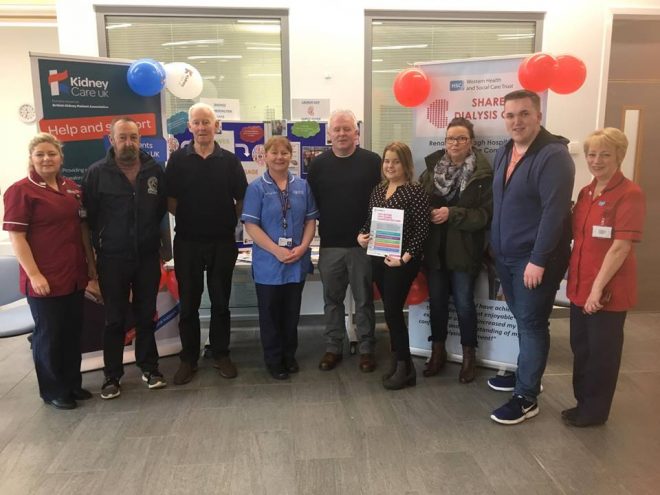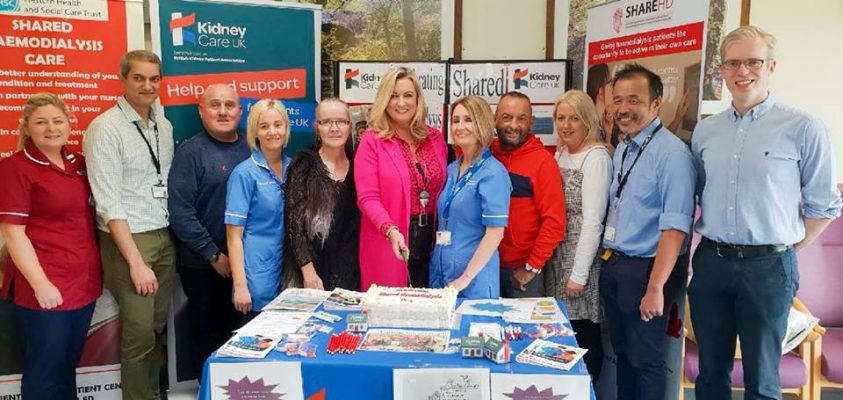 THE Western Trust’s Renal Units at Altnagelvin Hospital in Derry and Omagh Hospital and Primary Care Complex relaunched their Shared Haemodialysis Care programmes recently.
THE Western Trust’s Renal Units at Altnagelvin Hospital in Derry and Omagh Hospital and Primary Care Complex relaunched their Shared Haemodialysis Care programmes recently.
Shared Haemodialysis Care (SharedHD) is an initiative in which hospital haemodialysis patients are supported by their dialysis staff to become as involved as they wish in their own care.
There is considerable evidence that greater patient engagement and helping people to manage their own health, is associated with better outcomes across a range of medical conditions.
Shared Haemodialysis Care was first launched in the Western Trust in 2018 as part of a national quality improvement project.
Shared Care offers patients attending hospital dialysis the opportunity, where interested, to become active participants in their care.
Patients are invited to participate in a number of tasks (ranging from simple tasks like washing their hands to more complex tasks like preparing their machine), which they are trained to do by their dialysis nurse or dialysis assistant until they are deemed confident and competent to perform them independently.
They are then supported by the dialysis staff at each session, to do as little or as much as they feel willing and able on a day to day basis.
At present, there are approximately 121 patients (average age 67 years) under-taking hospital based dialysis in the Western Trust.
Sixty-one of these patients are undertaking at least one task and 20 individuals are undertaking at least five tasks.
Dr Ying Kuan, Associate Medical Director in Quality Improvement and Consultant Nephrologist for the Western Trust, said:
“National Guidelines emphasise the importance of enabling patients to actively participate in their own care. We are very encouraged by both the enthusiasm shown by our patients regarding the Shared Care programme, and the remarkable benefits to patients that we have seen so far as a result of this initiative.
Dr Kuan added: “At present the age of individuals participating in the Shared Care programme ranges between 27 and 83 years.
“The ability to participate in Shared Care is not dictated by a patient’s age and the dialysis staff are excellent in adapting the training to each individual.
“As a result of attending the dialysis unit three times every week for a four hour treatment session, patients become familiar with what is involved in their dialysis care, as it is a repeated process.
“The frequent attendances also build trust and strong relationships with our dialysis staff.
“When a patient decides to partner in their care they are given full training, guidance and support and they can learn at their own pace. This enhanced support alleviates any of their fears.”
 Dr Kuan continued: “The feedback from our patients taking part in Shared Care has been very positive.
Dr Kuan continued: “The feedback from our patients taking part in Shared Care has been very positive.
“Patients who have embraced Shared Care feel more empowered and have become more interested in the dialysis care process and how it affects their overall health and wellbeing.
“This has allowed them to make better health choices and crucially, to regain some control of what is happening to them; something which is really important for mental health when living with a chronic illness.
“The success of this programme is down to both patient engagement and our excellent renal multi-disciplinary team; in particular the dialysis nurses and renal unit nurse managers who have gone above and beyond to make the provision and delivery of this treatment option a reality.
“As a renal team we are so proud to see our patients in the Shared Haemodialysis Care programme progress from total dependence, to taking part in some aspect of their care and as a consequence of this, seeing them develop and grow in their skills, joy, courage and confidence.”
Tags:




